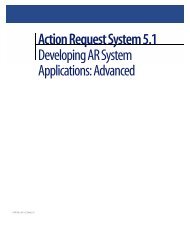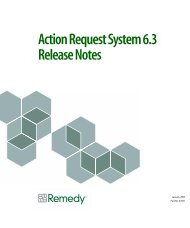BMC Remedy Action Request System 7.6.04: BMC Remedy Mid Tier ...
BMC Remedy Action Request System 7.6.04: BMC Remedy Mid Tier ...
BMC Remedy Action Request System 7.6.04: BMC Remedy Mid Tier ...
You also want an ePaper? Increase the reach of your titles
YUMPU automatically turns print PDFs into web optimized ePapers that Google loves.
<strong>BMC</strong> <strong>Remedy</strong> <strong>Action</strong> <strong>Request</strong> <strong>System</strong> <strong>7.6.04</strong><br />
148 <strong>BMC</strong> <strong>Remedy</strong> <strong>Mid</strong> <strong>Tier</strong> Guide<br />
Table B-4: Operators (Sheet 2 of 3)<br />
Operator <strong>Action</strong><br />
NOT ! Negates the condition that follows. If the condition is false, the result is<br />
true. For example, NOT ’Status’="New” finds all requests that are not<br />
new.<br />
You can use an exclamation point (!) instead of the word NOT.<br />
LIKE Performs a pattern search. For example, ’Submitter’ LIKE “Bob%ton”<br />
finds all requests with a submitter name that begins with the letters Bob<br />
and ends with the letters ton—such as Bob Compton and Bobby Fenton.<br />
The LIKE operator is useful only with character and diary fields.<br />
Use square brackets and the LIKE operator for Sybase databases. Square<br />
brackets and the LIKE operator do not work with Oracle or Informix<br />
databases. See the Database Reference, “Using relational databases with<br />
AR <strong>System</strong>,” page 13, and the Workflow Objects Guide, “Operators,”<br />
page 216.<br />
+ Adds two numerical values (integer, real values, or decimal).<br />
Adds an integer interval to a date/time value.<br />
Adds two character strings.<br />
For example, ’Create date’ > $DATE$ + (8*60*60) finds all requests<br />
that were created after 8:00 a.m. today. (8*60*60 is the number of<br />
seconds in 8 hours.)<br />
- Subtracts two numerical values (integer, real values, or decimal).<br />
Subtracts two date/time values (resulting in an integer). Subtracts an<br />
integer interval from a date/time value.<br />
For example, ’Create date’ > $TIMESTAMP$ - (7*24*60*60) finds<br />
all requests that were created within the past week. (7*24*60*60 is the<br />
number of seconds in one week.) This is useful to include in a custom<br />
report of all requests created in that week.<br />
* Multiplies two numeric values. For example, ’Quantity’ * ’Price’ ><br />
50 finds all requests where the contents of the Quantity field multiplied<br />
by the contents of the Price field is over 50.<br />
/ Divides two numeric values. For example, ’Total Expenses’ /<br />
’Total Income’ = 2 finds all requests where the total amount spent<br />
for expenses is twice the total amount of income.<br />
% Modulo of two integer values (the remainder of a division of the values).<br />
Because a percent sign is also a valid wildcard symbol, the context<br />
determines how it is interpreted. When used as part of a search<br />
statement, it is interpreted as a wildcard symbol; when used in the<br />
expression where an operator is expected, it is interpreted as modulo.<br />
Note: Use the modulo operator only with fields whose data type is<br />
integer. If you use this operator with fields that have other data types,<br />
such as Date/Time, an error occurs.<br />
< Matches contents that are less than the value. For example, ’Create<br />
date’ < ($TIMESTAMP$ - 24*60*60) finds all requests created more<br />
than 24 hours ago. ([24*60*60] or 86400, is the number of seconds in 24<br />
hours.)





